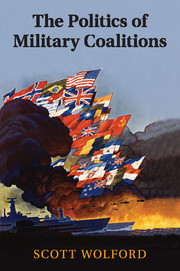5 - Durability, Balancing, and Conflict Expansion
Published online by Cambridge University Press: 05 September 2015
Summary
If we stayed neutral, whichever side won would surely punish Turkey for not having joined them, and would satisfy their territorial ambitions at our expense.
Mehmed Talaat Pasha Source Records of the Great War, Vol. II, ed. Charles F. Horne, p. 398Their military benefits aside, coalitions are aggregations of power that can provoke serious fears about the future in third parties that observe them waging war against their targets. Just as with the formation of alliances, coalitions may provoke counter-coalitions of their own (Vasquez 2009, ch. 5), and simple verbal statements of reassurance or limited intent are unlikely to be convincing (Kydd 2005). For example, in 1979, the Red Army entered Afghanistan to assist that country's Communist government against a popular insurgency, hoping to prevent the “loss” of Afghanistan to the West and to salvage Soviet prestige (Kalinovsky 2011, p. 24). Despite these ostensibly localized aims – to say nothing of the Soviet Union's considerable military might – neighboring Pakistan chose to support the Afghan rebels, fearing a subsequent invasion if the Soviet-Afghan coalition were successful (Amin 2010, pp. 86–89). On the other hand, in 1990, another superpower, the United States, assembled a coalition to reverse Iraq's annexation of Kuwait, drawing military contributions from regional powers like Saudi Arabia, Egypt, and Turkey. Yet despite long-standing rivalries with nearby Sunni governments and a fraught recent history with the United States, neighboring Iran remained neutral, apparently confident that a coalitional victory in Iraq would not pose a serious threat to its security. Twelve years later, however, as the United States led a different coalition into Iraq, Iran did not remain on the sidelines, providing material support to elements of what would become a widespread anti-occupation insurgency.
- Type
- Chapter
- Information
- The Politics of Military Coalitions , pp. 152 - 205Publisher: Cambridge University PressPrint publication year: 2015



